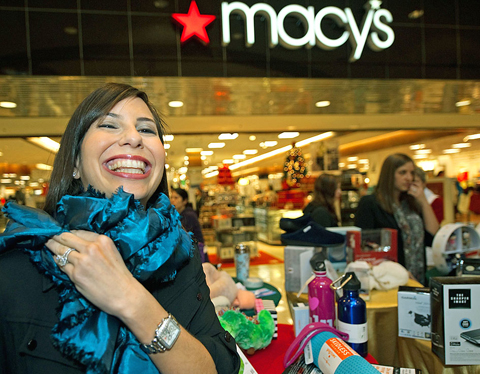US retailers extended discounts on computers, toys and clothes beyond Christmas to lure consumers who held out for lower prices and have gift cards to redeem.
Starting online on Friday, Best Buy Co trimmed the price of a Dell Studio 17-inch notebook computer to US$699.99 from US$779.99. Toys “R” Us Inc shoppers who buy a Nintendo Wii video game can buy a second game for half price.
Wal-Mart Stores Inc is trying to keep consumers coming back by offering a US$50 gift card on purchases of Microsoft Corp’s Xbox 360 consoles through Friday. Promotions intensified after last weekend’s East Coast snowstorm hurt sales going into Christmas.

PHOTO: AFP
The Washington-based National Retail Federation was holding to its forecast for a 1 percent drop in holiday sales, Ellen Davis, a spokeswoman, said last Sunday. The International Council of Shopping Centers on Tuesday reiterated its forecast for a 2 percent increase in sales.
“We expect a strong Dec. 26 shopping day since it falls on Saturday this year, which should close out December with a bang,” Lisa Walters and Sapna Shah, principals of Retail Eye Partners, a New York-based research firm, wrote in a report. “We expect early-morning specials and compelling offers by retailers to boost selling levels to make up for the slower start to December.”
Saks Inc, the New York-based luxury retailer, said it was offering up to 70 percent off from 8am to noon yesterday, after which the discounts would revert to 40 percent. J.C. Penney Co said it would open stores at 5am, its earliest opening ever for the day after Christmas, and offer more than 100 so-called doorbusters.
“Shoppers have been savvier than ever when it comes to price and promotion this holiday season,” Walters and Shah wrote. “Promotions have still been needed to get shoppers in.”
Meanwhile, thousands of Australians lined up overnight to be first through the doors at annual post-Christmas sales yesterday, with retailers expecting almost A$15 billion (US$13.24 billion) to be spent.
Hardcore bargain hunters began gathering from midnight outside the nation’s major department stores to ensure their spot at the head of the line for traditional Boxing Day discounts.
Consumer confidence has improved from last year, when the country was feeling the effects of the global financial crisis, and the Australian National Retailers’ Association (ANRA) said it was cautiously optimistic.
“We’ve had a fabulous healthy start to Boxing Day sales which is after all the biggest shopping day of the year,” ANRA chief Margy Osmond said. “Thirty percent of annual revenue comes from the Christmas-New Year period and with an estimated 14.7 billion dollars to be spent nationally in the sales it’s a good start to the New Year for retailers.”
The figure is more than double last year’s forecast of A$6.3 billion.
Shoppers were expected to part with an average A$250 each, ANRA said, with clothing, electronics, televisions and cookware the most sought-after items.

Quanta Computer Inc (廣達) chairman Barry Lam (林百里) is expected to share his views about the artificial intelligence (AI) industry’s prospects during his speech at the company’s 37th anniversary ceremony, as AI servers have become a new growth engine for the equipment manufacturing service provider. Lam’s speech is much anticipated, as Quanta has risen as one of the world’s major AI server suppliers. The company reported a 30 percent year-on-year growth in consolidated revenue to NT$1.41 trillion (US$43.35 billion) last year, thanks to fast-growing demand for servers, especially those with AI capabilities. The company told investors in November last year that

Intel Corp has named Tasha Chuang (莊蓓瑜) to lead Intel Taiwan in a bid to reinforce relations between the company and its Taiwanese partners. The appointment of Chuang as general manager for Intel Taiwan takes effect on Thursday, the firm said in a statement yesterday. Chuang is to lead her team in Taiwan to pursue product development and sales growth in an effort to reinforce the company’s ties with its partners and clients, Intel said. Chuang was previously in charge of managing Intel’s ties with leading Taiwanese PC brand Asustek Computer Inc (華碩), which included helping Asustek strengthen its global businesses, the company

Taiwanese suppliers to Taiwan Semiconductor Manufacturing Co. (TSMC, 台積電) are expected to follow the contract chipmaker’s step to invest in the US, but their relocation may be seven to eight years away, Minister of Economic Affairs J.W. Kuo (郭智輝) said yesterday. When asked by opposition Chinese Nationalist Party (KMT) Legislator Niu Hsu-ting (牛煦庭) in the legislature about growing concerns that TSMC’s huge investments in the US will prompt its suppliers to follow suit, Kuo said based on the chipmaker’s current limited production volume, it is unlikely to lead its supply chain to go there for now. “Unless TSMC completes its planned six

TikTok abounds with viral videos accusing prestigious brands of secretly manufacturing luxury goods in China so they can be sold at cut prices. However, while these “revelations” are spurious, behind them lurks a well-oiled machine for selling counterfeit goods that is making the most of the confusion surrounding trade tariffs. Chinese content creators who portray themselves as workers or subcontractors in the luxury goods business claim that Beijing has lifted confidentiality clauses on local subcontractors as a way to respond to the huge hike in customs duties imposed on China by US President Donald Trump. They say this Chinese decision, of which Agence